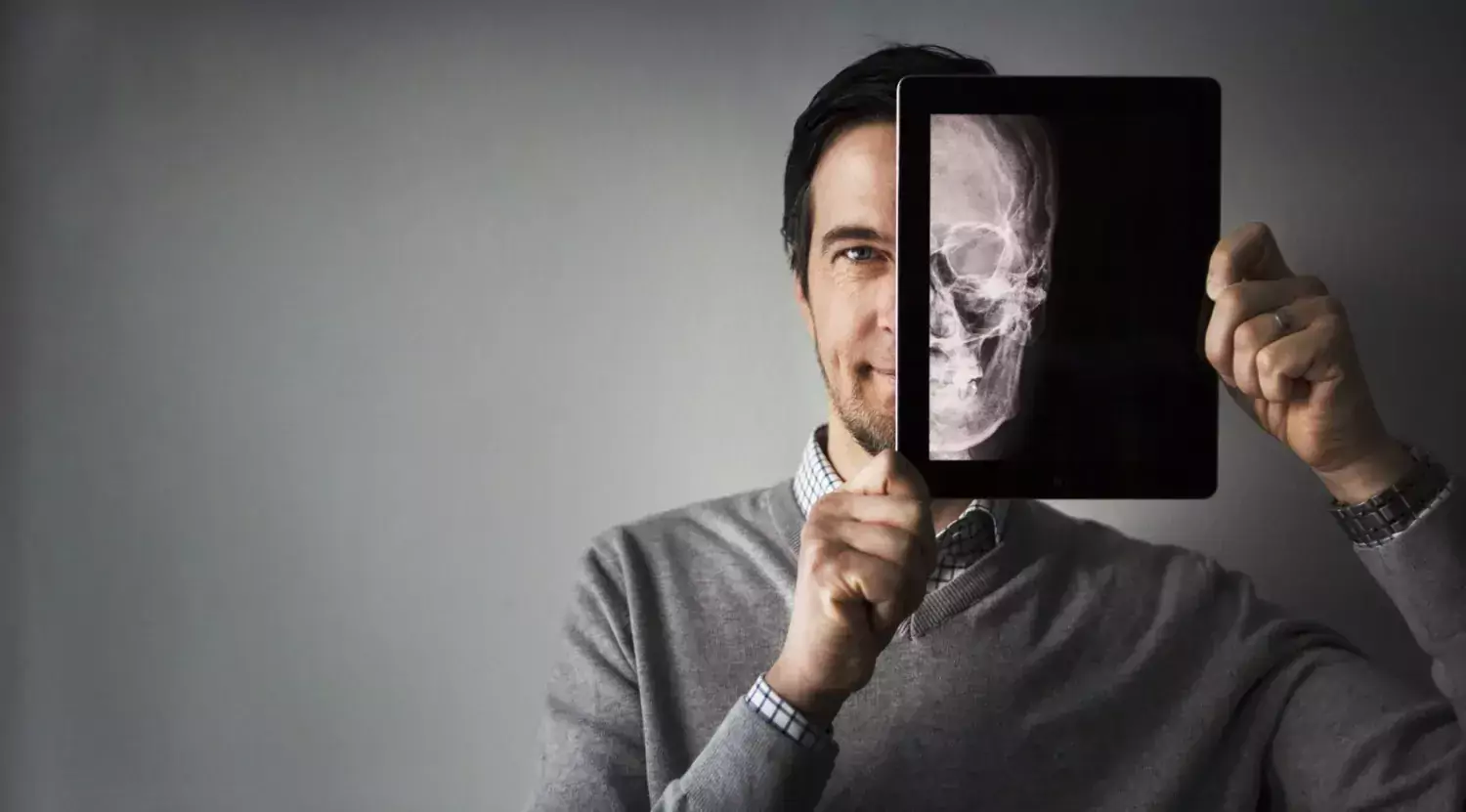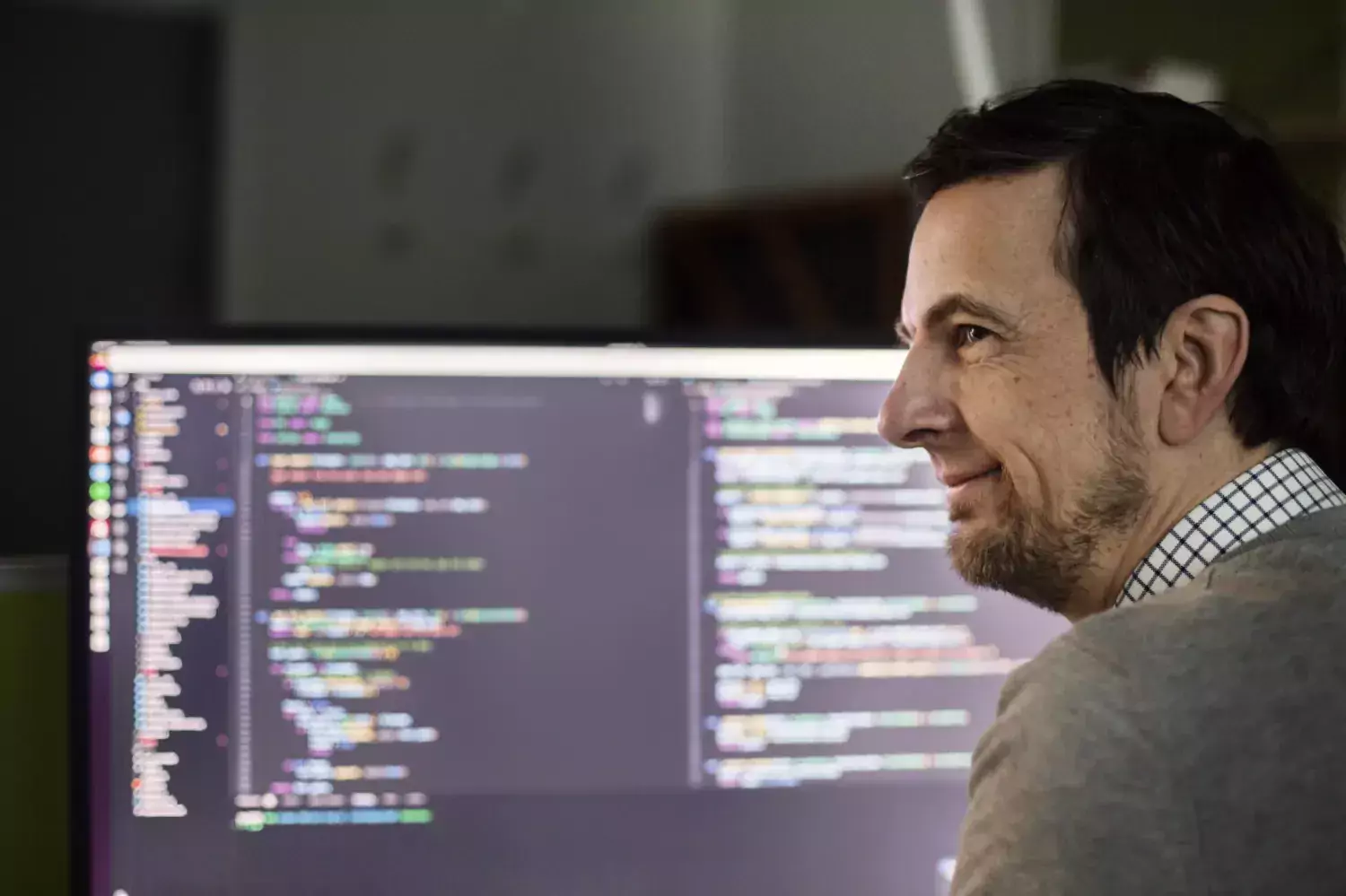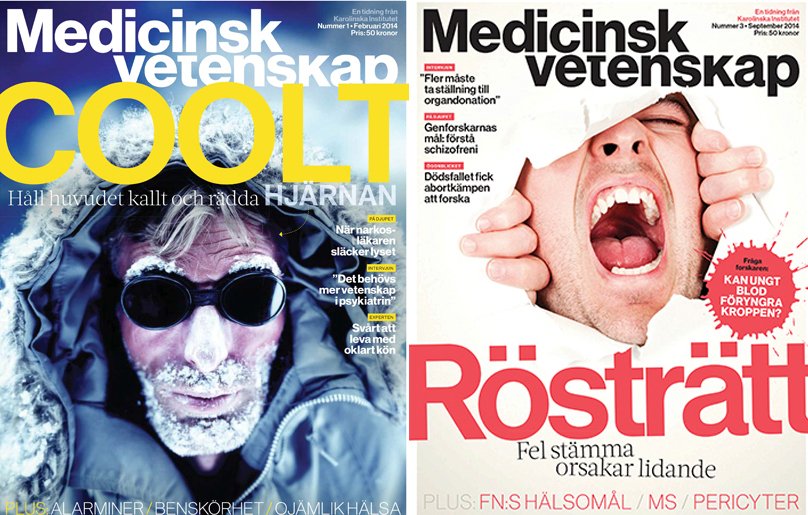He wants to MAX the benefits of AI

The 2023 AI Swede of the Year feels no need to be at the center of research. Yet that is exactly where he is. The orthopaedic surgeon and researcher Max Gordon was an early adopter of artificial intelligence. Now everyone else wants to know how to do it.
Text: Cecilia Odlind, first published in Medicinsk Vetenskap nr 1 2024.
When I ask Max Gordon if he has a motto, he kind of knows. But he struggles to formulate it succinctly and I'm not much help.
"I'll see what ChatGTP thinks," he says, and pops in a question.
The answer comes quickly: "Quality over quantity".
"How would I survive without ChatGTP," laughs Max Gordon, who says he uses the service "all the time".
In October 2023, he was named AI Swede of the Year, a prize awarded by the industry and employer organization TechSverige to a person who has contributed to the development and visibility of Swedish AI. He learned programming at Forsmark High School and already ten years ago he started a project in collaboration with KTH to use AI to help analyze X-ray images. But things were a bit slow.
”We were advised to look for other solutions. But I'm quite stubborn and we finally managed to develop algorithms that were able to correctly identify fractures, arthrosis and other common outcomes in more than 9 out of 10 cases," says Max Gordon.
However, he hasn't quite got AI into everyday life, at least not in orthopaedics. But nowadays, researchers in most fields are interested in using AI in their research. Max Gordon and his colleagues are busy. In 2023, they launched the Clinical Artificial Intelligence Laboratory, an AI lab where researchers can develop clinical AI-driven applications.
"Many people have contacted us, and we already have a number of projects underway, including collaboration with researchers in Umeå, Gothenburg and Skåne," he says.
Preventing disease is one goal. Gordon mentions a project in cardiac medicine where researchers in Austria have developed an AI that can use existing data on patients treated for non-cardiac conditions. By analyzing existing data, the AI can detect and warn patients if they are at high risk of a cardiovascular event in the next five years. They are then encouraged to seek care to prevent heart attacks and other conditions.
“We are now testing how this can be used in Sweden and several other European countries. Again, this is information that already exists and AI can help us use it in the best possible way," says Max Gordon.
AI research in different disciplines
Another example involves gynecological cancer. Researchers at Karolinska Institutet who are also active at Södersjukhuset have developed an algorithm that detects cervical cancer on ultrasound images. So it's not just orthopaedics that interests Max Gordon these days.
"We start projects in many different disciplines. The common factor is that AI can be used to answer the research questions and that we see a path to implementation," says Max Gordon.
The greatest progress has been made in using AI to interpret images. But the language models, which have been widely adopted in 2023, may also affect healthcare.
"In a Swedish study, we are investigating how ChatGTP and similar services can be used to summarize medical records, which can make healthcare more efficient," says Max Gordon.
Max Gordon is passionate about getting evidence-based research into healthcare. The healthcare system is generally quite poor at this, he says, citing an Australian study that showed that only half of the knowledge available on orthopaedic procedures was actually used in the clinic.
- As doctors, it is our responsibility to keep up to date with the latest research and integrate it into our care. But this is a challenging task as there is a lot of research being done. However, not applying evidence-based practices can lead to unnecessary costs for society and risks for patients," he says.
Again, the solution is AI.
'For this type of task, AI is perfect,' says Max Gordon.
AI much faster
For example, he predicts that AI will be able to help us do meta-analysis, where many smaller studies are combined and analyzed together to draw more robust conclusions. This has been a time-consuming task so far, and once the meta-analysis is published, new studies have often been added.
“But AI does this incredibly much faster than we do, so the model can always be updated with the latest studies. I think this will explode in the coming years and have a major impact on, among other things, the ability to implement new results in clinical activities," says Max Gordon.
Today, everyone, whether you are a DNA researcher or a clinician, can probably see that there is great potential for AI's use in medical research. But AI is not autonomous, it is influenced by what we feed it.
"You are what you eat. AI is often about developing and testing new algorithms. But this rarely affects the outcome, what is important is the data we feed it with. If the data we start with is inadequate, it will be difficult for AI to learn. Therefore, it is important to collect complete and structured data. And this of course applies to all research in general, not only AI-related research," says Max Gordon.
He gives an example: "If you take skin photographs in two different environments that are very different in terms of light, you have to make sure that the AI really detects what we are looking for and does not instead detect the difference in light.

Many feel that AI has exploded recently. But Max Gordon sees it has been moving forward at a steady pace.
"I would say that the development is linear, apart from individual jumps. There is no revolution just around the corner. Some things in AI are quite easy to develop, such as self-driving cars. But to unleash them in traffic, they need to be able to handle all potential anomalous events and that has taken years. "The odd cases are the hardest to teach AI," he says.
AI can do the boring things
He is not worried that AI in general poses a threat to humans.
"We already see that there is a significant risk of AI being used in war situations to create drones and other machines designed to take lives. I think we need to regulate this, but it's not really my area, in medical technology we already have a fairly well-functioning regulatory framework," says Max Gordon.
In his field, research and medicine, he is very positive about the future, not least for doctors.
"AI is very good at doing fairly easy things that are boring and frequent; if something is soul-killingly boring, AI is probably well suited to do it. Doctors and researchers will be able to focus more on the difficult cases, those that deviate and require careful assessment. I'm absolutely convinced that medicine will be ten times more fun in ten years," he says.
He believes this also applies to other healthcare professions.
“For example, AI can alert if a patient starts to move in an anxious way. Nurses would then be able to focus on the patients with the greatest needs and this could hopefully reduce their stress," he says.
Max Gordon thinks that AI should also be used more to evaluate healthcare interventions, for example to find better reimbursement models.
- "It has never been easier to do systematic quality monitoring. It can both save money and increase patient satisfaction," he says.
About Max Gordon
Title: Associate Professor at the Department of Clinical Sciences, Danderyd Hospital, Karolinska Institutet and Senior Consultant in Orthopaedics at Danderyd Hospital.
Age: 45.
Family: Wife and three children who are 11, 9 and 2 years old.
How I relax: I program, such as scheduling programs. It's a bit like soduko, you solve a problem that is a bit challenging and shut out the world for a while.
Inspired by: The programmer Hadley Wickham who made a revolution in R (a programming language). Good programming is beautiful, like art. But I'm also inspired by people who manage to go against the grain, who believe in their idea when no one else does. Like this year's Nobel Prize winner Katalin Karikó. Who dare to wait for success and not just jump on the latest trend.
Best research trait: Being able to see new possibilities and combine different worlds. My background as a programmer and my Polish origin are elements that give me different perspectives in my research role.
Max Gordon on...
...challenges in healthcare: Huge advances in research and treatment have meant that we now live longer. This has certainly led to an increased need for care, but this is basically due to a positive development, we should not forget that.
...the importance of publishing in top journals: The most important thing is to create value for patients. If it is good and important research, it will be noticed even if it is not published in the finest journals.
... what AI can do now (but not ten years ago): AI was lousy at languages when we started trying to use X-ray responses to train our image models. ChatGPT is arguably one of the biggest surprises we've seen in the field.
...AI in healthcare in ten years' time: We will have many models that help us with the administrative work. AI will also help with the interpretation of images to a large extent, but also signal data from monitoring, such as ECG or fetal movements.

The magazine Medical Science
The magazine Medical Science (Medicinsk Vetenskap) is published by Karolinska Institutet and targets the general public interested in medical science.
